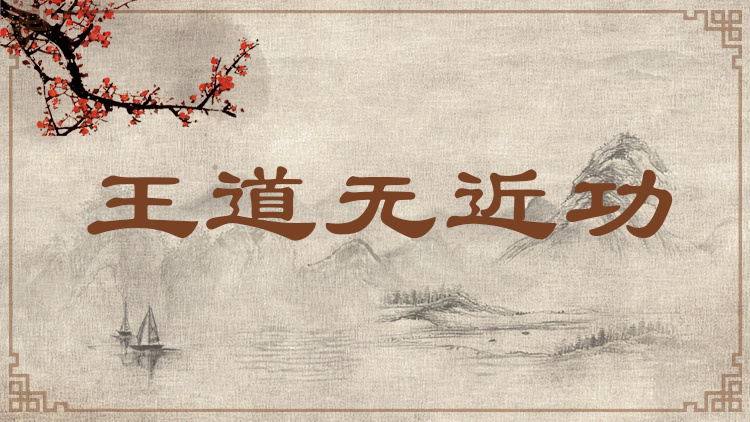王道无近功
The Righteous Way Seeks No Immediate Gains

本指以仁义治理天下,不贪图眼前功利;后泛指遵循“正道”(正确的原则或方法),不急功近利。因为急功近利只能小成,不可能大成;而小成只能是暂时的,不可能持续长久,还可能偏离“正道”,带来无可挽回的后果,最终导致一事无成。胸怀大志,谋大事者,必然从全局、根本着眼,从长远考虑问题,始终依“正道”行事,不为一时得失而改变志向。其要义在于,大功无速成,正道须持守。
The term originally meant that in exercising governance, a ruler should act with benevolence and righteousness and not be tempted to seek immediate gains. Later, it came to mean the need to follow the righteous way, namely, sound principles or approaches, instead of seeking immediate gains. Such gains are not only petty and transitory in nature and unsustainable, but may also cause irreversible adverse consequences. Those who aim high should therefore focus on the big picture and long-term overall interests. They should always follow the righteous way and never allow themselves to be distracted by petty gains. The underlying message of this term is that no great accomplishment can be made quickly and easily and the righteous way must be followed.
引例 Citations:
◎岂知王道本无近功,成书亦非岁月哉!(项穆《书法雅言·功序》)
岂不知以仁义治理天下不会很快奏效,学成书法哪有不费时日的呢?
One should know that the righteous way of exercising governance does not produce immediate results, just as good calligraphy cannot be learned without years of practice. (Xiang Mu: Right Ways for Learning Calligraphy)
◎圣人无近功,故至诚无息。(黄宗羲《明儒学案·诸儒学案中六·庄裕徐养斋先生问》)
圣明的人不图眼前的功利,所以能做到极其真诚,永无止境。
Sages are never distracted by immediate gains. That is why they can pursue the ultimate goal ceaselessly and with conviction. (Huang Zongxi: Commentaries on Writings of Famous Scholars of the Ming Dynasty)
推荐:教育部 国家语委
供稿:北京外国语大学 外语教学与研究出版社
责任编辑:钱耐安





